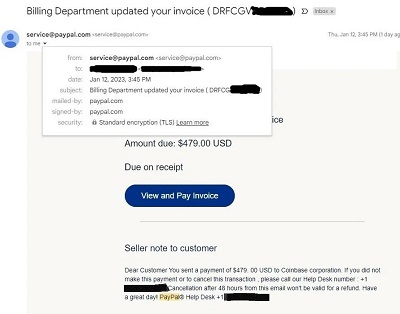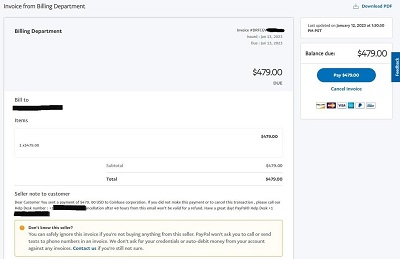Pro-forma Invoicing-scam
Guard your business against pro-forma invoicing scams. Discover the deceptive tactics scammers employ to send fake invoices and defraud unsuspecting businesses. Stay informed, stay safe!
The pro-forma invoicing scam unfolds when sales representatives from a publishing company reach out to businesses, making false assertions that the business had previously committed to advertising in a specific publication. This deceptive practice is also known as "false invoicing" or "false billing." The primary victims of this scam are often small businesses. It's important to note that engaging in pro-forma invoicing is a violation of the Fair Trading Act. Stay vigilant to protect your business from falling prey to such fraudulent activities. If you have encountered this scam, consider reporting it to relevant authorities to help prevent others from becoming victims.
Unraveling the Web of Pro-forma Invoicing Scams
Pro-forma invoicing scams continue to be a threat to businesses, with salespeople from publishing companies targeting unsuspecting enterprises. These scams often involve false claims that a business had previously agreed to advertise in a particular publication, leading to unauthorized invoices and potential financial losses. Small businesses, in particular, are vulnerable to such deceptive practices.
Strange scam using PayPal Invoices
I recently received a strange email from PayPal about an invoice. In the email it says "Billing Department updated your invoice. Amount due: $479.00 USD." At first,
I thought it was a phishing email pretending to be PayPal but when I checked the email headers it was indeed signed and sent by PayPal. There was a note saying that I
supposedly made a payment to Coinbase corporation for $479.00 and to call some toll free number to cancel the supposed payment claiming it to be PayPal's number. When I
logged in my PayPal account without clicking the link the invoice showed up with some strange name in my recent activity though when I clicked on the invoice it just gave
me an error saying "Something's not right." When using the link from the email, which is indeed a legit PayPal link, (in an incognito browser window, just in case) it also
shows some random Gmail email address associated with the scammer's PayPal account.
They seem to be exploiting PayPal's invoice system which not only sends a legit email from PayPal but also places the invoice (for some reason...) in your recent activity of your
PayPal account possibly making people think that money was actually taken out of their bank account then they might call their fake number pretending to be PayPal to try to get
the "transaction" cancelled and ask them to give their banking information.
How the Scam Operates
Salespeople adept at this scheme initiate contact with a business, asserting that the business had committed to advertising in a specific publication. This misleading tactic creates an illusion of an existing agreement, pressuring the targeted business to fulfill the false commitment.
Impact on Small Businesses:
Small businesses, lacking extensive legal departments and resources, are disproportionately affected by pro-forma invoicing scams. The financial strain resulting from these deceptive practices can be significant, threatening the stability and growth of the business.
Preventing Pro-forma Invoicing Scams
Businesses can take proactive steps to protect themselves from falling victim to pro-forma invoicing scams
- Verification of Agreements: Always ask for concrete proof that an advertisement agreement was legitimately agreed upon before making any payments. Without substantial evidence, businesses should refrain from making payments.
- Internal Confirmation: Verify advertising bookings with colleagues to ensure that the information aligns with the company's records. Internal communication and confirmation processes are vital in preventing unauthorized transactions.
- Legal Authorization: Demand specific evidence demonstrating that the publishing company has a legitimate agreement to publish the magazine on behalf of the organization. This adds an additional layer of scrutiny to the purported arrangement.
- Document Communication: Keep meticulous records of telephone conversations related to advertising, including dates, topics discussed, and the individuals involved. Thorough documentation can serve as evidence in case of disputes.
- Robust Booking Systems: Implement a well-structured advertising booking system within the organization. Ensure that all staff members are familiar with the procedures to avoid unauthorized commitments.
- Written Communication: In case of unauthorized charges, communicate in writing to the invoicing company, clearly stating that any unauthorized advertisements will not be paid for.
- Legal Protection: Seek legal advice if threatened with legal action. Having legal counsel can help navigate the complexities and protect the business's interests.
Businesses must remain vigilant and informed to thwart pro-forma invoicing scams, preserving their financial well-being and safeguarding against deceptive practices.
How to avoid this invoicing
- Request evidence proving that the agreed-upon advertisement was legitimate before making any payment.
- Double-check the booking details with your colleagues to ensure accuracy.
- Demand specific proof that the publishing company has a legitimate agreement to publish the magazine on behalf of an organization.
- Maintain detailed records of telephone conversations related to advertising, including dates, topics discussed, and the individuals involved.
- Implement a robust advertising booking system, and ensure all staff members are familiar with its procedures.
- Communicate in writing to the company that any unauthorized advertisements will not be paid for.
- If faced with threats of legal action, consider seeking legal advice to protect your interests. Stay informed and vigilant to safeguard your business from pro-forma invoicing scams.








